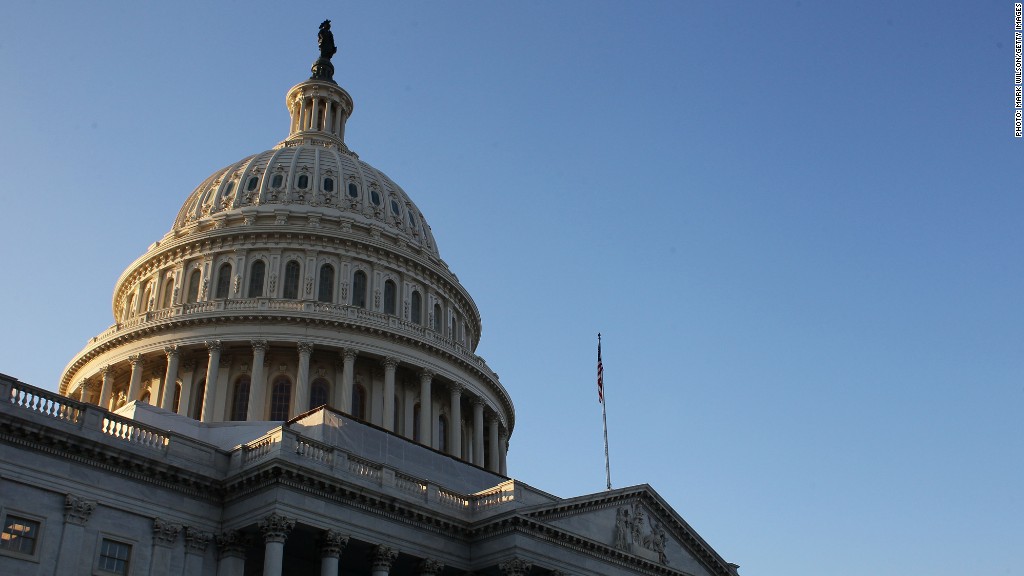
The fiscal cliff is a man-made disaster waiting to happen.
It starts to take effect in January and includes $7 trillion worth of tax increases and spending cuts over a decade.
While that might seem like a deficit hawk's dream come true, it's anything but.
"It's too big, too quick, and focuses on the wrong parts of the budget," said Maya MacGuineas, who is spearheading the nonpartisan Campaign to Fix the Debt.
Among the policies at issue: reductions in both defense and non-defense spending; the expiration of the Bush tax cuts; the end of a payroll tax holiday and extended unemployment benefits; and the onset of reimbursement cuts to Medicare doctors.
In addition, the debt ceiling -- the legal limit on federal borrowing -- will need to be raised by early next year from its current level of $16.394 trillion.
If left in place, the fiscal cliff would lead to the biggest single-year drop in the annual deficit as a percent of the economy since 1969. (Related: CBO warns of fiscal cliff risk)
But because it would be so abrupt and arbitrary, it also could throw the United States back into a recession next year, when more than $500 billion will be taken out of the economy.
To avoid that, President Obama and Congress will need to act quickly to avert at least some parts of the fiscal cliff.
So what, exactly, makes up the fiscal cliff?
Automatic spending cuts
Since Congress failed last year to reach a bipartisan debt-reduction deal, the Budget Control Act requires automatic spending cuts to commence on Jan. 2 that will amount to $1.2 trillion in deficit reduction over 10 years.
Defense: $55 billion will be cut in 2013 from projected levels of discretionary defense spending. That translates into at least a 10% cut to every program, project and activity that's not explicitly exempt.
Nondefense: $55 billion will be cut from projected levels of nondefense spending, which includes things like education, food inspections and air travel safety. Budget experts estimate the cuts will result in at least an 8% cut to programs, projects and activities.
Bush tax cuts
The Bush tax cuts, the eternal partisan trip-wire, are set to expire Dec. 31. And as a result:
Income tax rates: Rise to 15%, 28%, 31%, 36% and 39.6%, up from 10%, 15%, 25%, 28%, 33% and 35%.
Capital gains rate: Rises to 20% from 15% for most filers.
Qualified dividend rate: Rises to one's top income tax rate, up from 15% for most filers.
PEP/Pease limitations: Restored. High-income households may not be able to take some itemized deductions and personal exemptions in full.
Child tax credit: Falls to $500 per child from $1,000. The refundable portion also reduced.
American Opportunity Tax Credit: Expires. The lesser value HOPE tax credit for college tuition is reinstated. Several smaller education tax benefits also expire.
Earned Income Tax Credit: Expansion of eligibility for the credit expires.
Marriage penalty relief: Expires. Effectively that means a low- or middle-income two-earner couple will owe more to the IRS than they would if they were single making the same income.
Estate tax: Parameters revert to pre-2001 levels. The exemption level falls to $1 million from $5 million; and the top tax rate on taxable estates rises to 55%, up from 35%.

AMT patch
Expired already for 2012. Income exempt from the Alternative Minimum Tax in 2012 -- for which taxpayers will file returns next year -- falls to $33,750 for individuals and $45,000 for married couples. That's down from $50,600 and $78,750, respectively, if the exemption amounts had been adjusted for inflation.
As a result more than 30 million people will be hit by the so-called "wealth" tax, up from 4 million to date.
Payroll tax holiday
Expires. The Social Security tax rate reverts to 6.2%, up from 4.2%, on the first $110,100 in wages. Effectively, someone making $50,000 will pay another $1,000 in payroll taxes next year.
Unemployment benefits extension
The federal extension expires. That means workers who lose their jobs after July 1, 2012, will only receive up to 26 weeks in state unemployment benefits, down from as many as 99 weeks in state and federal benefits that had been available until recently.
By one estimate, more than 2 million claimants will lose their benefits by January.
Tax extenders
A host of smaller individual and business tax breaks will have expired. A bipartisan bill from the Senate Finance Committee proposes to extend many of them, but it has not passed the Senate or House yet.
Medicare doc fix
Expires. Medicare payment rates for physician services drops by 27%.
Other
Some budget experts count as part of the fiscal cliff the onset of a new Medicare surtax on high-income households under health reform.
But unlike the other fiscal cliff tax provisions, the new tax was not written into law as a wink-wink "temporary" provision. It is, however, included to reflect the magnitude of tax increases set to take effect simultaneously in 2013.
A 0.9% surtax will apply to wages on earned income over $200,000 ($250,000 if married). That's on top of the 1.45% Medicare currently owed on all wages. Those making between $200,000 and $500,000, for instance, will only pay about $633 extra while households making $1 million or more would pay another $11,242.
A 3.8% Medicare surtax will also apply for the first time to at least a portion of high-income households' investment income.



